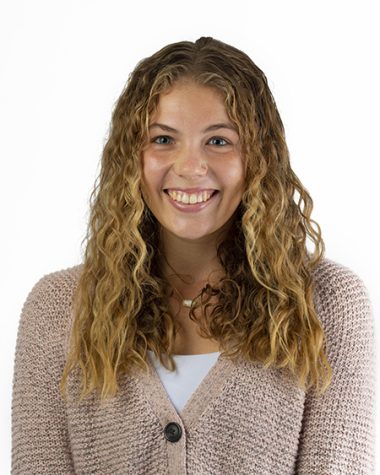UWL Athletic Trainer Alexis Schaefer discusses the mental health of student-athletes
October 18, 2022
As the NCAA community knows, this past year brought a lot of loss in the lives of student-athletes across the nation, and many colleges, including UWL, have taken measures to protect the mental health of their athletes.
Alexis Schaefer has been an athletic trainer for eight years, four of which have been at UWL. She has her bachelor’s in kinesiology athletic training and a master’s in exercise science, and she is currently working towards her master’s degree in mental health counseling. She said she recognizes the pressures and stressors that student-athletes face.
“The college-aged experience is one of the higher susceptibilities for all forms of mental struggles, anxiety, and depression especially. Freshman students are at the highest, and then freshman student-athletes are at the highest because they’re adjusting to the change, it’s new, it’s scary, you’re not only trying to figure out school, you’re trying to be the best you can in the pool, the court, the field,” Schaefer said.
“But college student-athletes in general, you guys have pressures and expectations and time commitments that none of us can wrap our heads around,” said Schaefer. “Coaches, administration, we are a part of it and we are supportive and we watch it, but push comes to shove, unless someone was a student-athlete, they do not understand, because it’s so much pressure.”
Ella Eck, a freshman on UWL Women’s Swim Team, said that there are a lot of stressors athletes face. “Waking up very early, juggling classes and swim schedules and figuring out what works best for me, for others, and meal times,” said Eck.
Schaefer said that UWL has implemented preventative measures to protect the mental health of student-athletes. “This year was the first year we did preventative, proactive mental health screenings. That has never happened before. We have had much more communication with the counseling and testing center. Chapin, our head athletic trainer, has been awesome about being very communicative and including them, and them including us.”
The pre-season mental health screenings had a counselor from the Counseling and Testing Center evaluate the athlete before they started practice to ensure they were in a healthy mindset for athletics. This year, the pre-season screenings were brand new to the program. The NCAA has lots of resources surrounding mental health available here for further information.
In regards to UWL implementing the pre-season screenings, Schaefer said, “First of all, NCAA, for many years, has suggested and the National Athletic Training Association, but NCAA is the rule makers for us, they have been strongly encouraging mental health screenings and support. But it was very vague and if you can, kind of thing. More recently it is becoming a requirement that there is some form of mental health aspect in our physicals or something.”
Schaefer said the need for mental health checks was the biggest reason they were implemented. “We were already wanting to, we had some ruling on the side, and there’s a need. That’s the biggest thing.”
Aly Wallander, a freshman on the UWL Women’s Swim Team, said she thinks having more mental health screenings would be a good idea. She said, “I know some people wouldn’t be willing to go out reaching for help, so maybe throughout the season having more mental health screenings.”
In addition to the pre-season screenings, there is also a physician. Schaefer said, “we also now have a physician, the women’s assistant volleyball coach, Deb, her other title is ‘student wellness.’ Her job is to create this more cohesive understanding of what you guys want and how we can meet those needs. I think there’s always room to grow and avenues to take, so we’re just starting.”
Schaefer said she would also like to see group therapy offered for athletes. Schaefer said, “I would love, my dream, personally, is at some point, we get student-athlete specific group therapy going on where we have groups that are focused around injury, groups focused around, that first-year student-athlete, groups focused around things that student-athletes struggle with but may not realize how many others struggle with, and there’s so much power, in sitting across and ‘oh my gosh, I totally get what you’re going through.’ Dream-dream is a therapist in-house for student-athletes. D1s have that, but we have to figure out how to do that.”
Besides what UWL is doing as a whole, Schaefer said she is trying to grow herself professionally. “Personally, I always try to just listen. Listening and validating goes a long way,” she said. “Professionally, I’m trying to grow my knowledge, my skill set, my licensing and certifications, so I can professionally support, advocate, and I just like talking about it.”
Maddy Albert-Nelson, a junior on the UWL Women’s Swim Team, said that she thinks Schaefer does a good job watching over the mental health of her athletes. Albert-Nelson said, “Alexis Schaefer, especially being the main trainer we deal with, she is always very cautious making sure we’re taking care of our mental health,” Albert-Nelson said.
Schaefer continued and said she loves how much mental health is talked about these days, but talking about change and actual change are two different things. Schaefer said, “just pick one thing, it can be as simple as starting a journal or making your bed. That small of a thing can do wonders for your mental health.”
She also said to figure out who the people are in your life you can talk to. “Know who your people are that you can talk about this with,” she said. “It’s not just a sit and listen to me people, those are good too. But everybody needs a person that they can also say and suggest things back. There’s a duality,” she continued.
“I always tell people who are going through crisis stuff, 3 people. Tell me your three people. Knowing your three people is something that is always encouraged. Always.” Brevin Kruse, a senior on the UWL Men’s Swim Team, said he has those people he can talk to. He said, “Definitely a lot of teammates that I know care about my well-being, and I know I care about theirs. And I would do anything to help them.”
For more information, refer to the mental health resources below.
Counseling and Testing Center: 608-785-8073
Great Rivers 211 24-hour Helpline: 211 or 800-362-TALK (8255)
Suicide and Crisis Lifeline: 988 (Veterans and Other Service Members press 1)
Hopeline (text): text ‘hopeline’ to 741741
Trevor Lifeline (LGBTQ): 1-866-488-7386
La Crosse County Crisis Line: 608-784-HELP (4357)
University Police (emergency): 911 or 608-789-9999
University Police (non-emergency): 608-789-9000
La Crosse Police (non-emergency): 608-782-7575







